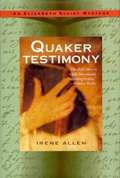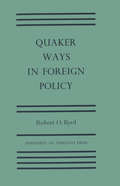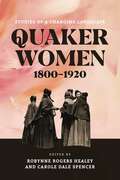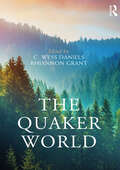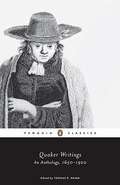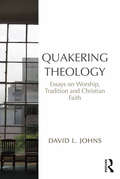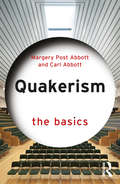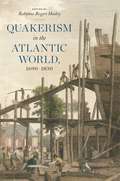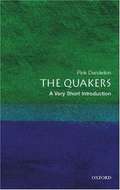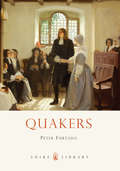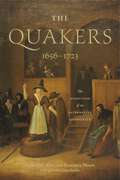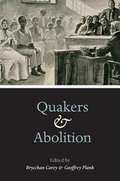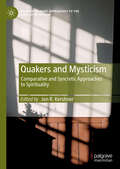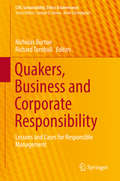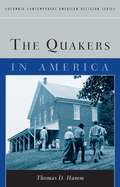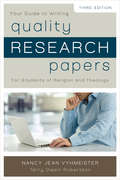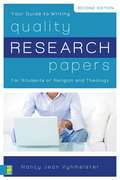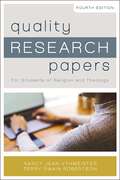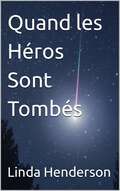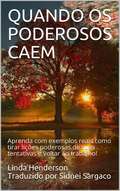- Table View
- List View
Quaker Summer
by Lisa SamsonSometimes you have to go a little bit crazy to discover the life you were meant to live. Heather Curridge is coming unhinged. And people are starting to notice. What's wrong with a woman who has everything--a mansion on a lake, a loving son, a heart-surgeon husband--yet still feels miserable inside? When Heather spends the summer with two ancient Quaker sisters and a crusty nun running a downtown homeless shelter, she finds herself at a crossroads. Life turns upside down for Heather in a Quaker Summer."One of the most powerful voices in Christian fiction, Samson delivers ...a staggering examination of the Christian conscience." -Publishers Weekly
Quaker Testimony (Elizabeth Elliot Quaker Mystery #3)
by Irene Allen[from the dust jacket:] "Widow Elizabeth Elliot lives a simple life in the bustling town of Cambridge, Massachusetts. As Clerk of the Quaker Meeting, she takes care of the daily business of running the Meeting and leads the congregation in prayerful meditation. She also serves as a moral authority. So when murder strikes at the heart of the nonviolent Quaker community, Elizabeth becomes a delightfully unconventional sleuth. Hope and Sheldon Laughton, a young Quaker couple, refuse to pay war taxes. The IRS plans to repossess the Laughton house due to their debts, so Elizabeth goes to the house to offer moral support. She is horrified to discover Hope murdered, lying in a pool of blood on the kitchen floor. The crime threatens to tear the community apart when suspicion falls upon a number of Quakers. Could the killer be Otto, a young Quaker and dear friend of the Laughtons, who also happened to have had a not-so-secret crush on Hope? Or could it be Sheldon himself, due to unseen strains in their marriage? Even Elizabeth is a suspect, and she is forced to spend a night in jail! Determined to discover the identity of the murderer, Elizabeth combines her quiet wisdom with perseverance as she makes her way to a shocking, disturbing discovery."
Quaker Ways in Foreign Policy
by Robert O. ByrdFor three hundred years the Society of Friends, or Quakers, has been forwarding to governments recommendations on foreign policy, and it has often been in the vanguard of thought in its social and political views. In this study, Dr. Byrd brings together and states carefully and accurately those beliefs, principles, attitudes, and practices which have been fundamental to the Quaker approach. He illustrates and verifies his statement by an analytical Friends acting in official and semi-official capacities, which relate to foreign policy and international relations.Dr. Byrd's systematic exposition of the modern Quaker's theory of international relations offers a stimulating antidote to the realpolitik school of thought. His account of the Quaker interest in international affairs from 1647 to the present underlines for the diplomatic historian the role of morality in diplomacy, the influence of public opinion upon policy, and the part played by groups like Friends in shaping public attitudes. As Hans J. Morgenthau comments in his Foreword, "In a world which uses Christian ethics for un-Christian ends it is indeed moving to follow the historical trail of a Christian sect which seeks to transform itself and political society in the image of Christian teaching. . . . In their convictions, achievements, and sufferings the Quakers bear witness to the teachings of Christianity; in their failures they bear witness to the insuperable stubbornness of the human condition. . . . not the least of the merits of Professor Byrd's book is his ability to convey through the movement of his mind and pen something of that moving quality which makes the Quaker approach to foreign policy, if nothing else, a noble experiment in Christian living."
Quaker Witness (Elizabeth Elliot Quaker Mystery #2)
by Irene Allen[from the dust jacket:] "The Clerk of a Quaker Meetinghouse has many important duties, ranging from presiding over interminable business meetings and answering difficult mail to helping keep the budget in balance. For Elizabeth Elliot, a lifelong member of the Quaker Meeting in Cambridge, being Clerk also means solving a murder or two." "Elizabeth is an intelligent and compassionate widow whose life once revolved around simple religious work and such domestic tasks as baking bread. These days, however, she finds herself developing new and somewhat unusual talents - including surreptitiously eavesdropping in hallways, interrogating graduate students about poisonous gas, and rooting out a ruthless killer - as the mild-mannered Quaker feels increasingly called to the grim avocation of crime-solving." "First introduced to us by Irene Allen in Quaker Silence, the capable Clerk has already proven that no obstacle that stands in the way of truth is too daunting for her to overcome. Now that she is familiar with murder investigations, not even mighty Harvard University, the Meeting's powerful neighbor just up Brattle Street, can intimidate her." "When an eminent paleontologist is found murdered in his lab at Harvard, suspicion automatically falls on a young graduate student, the professor's only female advisee, who has, coincidentally, just filed sexual harassment charges against him. Not surprisingly, the university is eager to handle both the murder and the troublesome student quietly and quickly, the matter as an open-and-shut case. Only Elizabeth who befriended the accused just before the murder, is convinced of the young woman's innocence." "Combining wisdom and patience with uncanny perception, Elizabeth carefully threads her way through a web of clues and contradictions to arrive at several disturbing conclusions that prove greed and corruption can thrive anywhere, even in the world of pure scientific research. Lovers of intelligent mysteries will thrill to this singular heroine and her subtle but effective ways of triumphing over evil. With Quaker Witness, Irene Allen once again offers compelling testimony to the possibility of decency and integrity in today's complex world." Bookshare has books one and three in the Elizabeth Elliot series: Quaker Silence and Quaker Testimony.
Quaker Women, 1800–1920: Studies of a Changing Landscape (The New History of Quakerism)
by Robynne Rogers Healey and Carole Dale SpencerThis collection investigates the world of nineteenth-century Quaker women, bringing to light the issues and challenges Quaker women experienced and the dynamic ways in which they were active agents of social change, cultural contestation, and gender transgression in the nineteenth century.New research illuminates the complexities of Quaker testimonies of equality, slavery, and peace and how they were informed by questions of gender, race, ethnicity, and culture. The essays in this volume challenge the view that Quaker women were always treated equally with men and that people of color were welcomed into white Quaker activities. The contributors explore how diverse groups of Quaker women navigated the intersection of their theological positions and social conventions, asking how they challenged and supported traditional ideals of gender, race, and class. In doing so, this volume highlights the complexity of nineteenth-century Quakerism and the ways Quaker women put their faith to both expansive and limiting ends. Reaching beyond existing national studies focused solely on white American or British Quaker women, this interdisciplinary volume presents the most current research, providing a necessary and foundational resource for scholars, libraries, and universities.In addition to the editors, the contributors to this volume include Joan Allen, Richard C. Allen, Stephen W. Angell, Jennifer M. Buck, Nancy Jiwon Cho, Isabelle Cosgrave, Thomas D. Hamm, Julie L. Holcomb, Anna Vaughan Kett, Emma Lapsansky-Werner, Linda Palfreeman, Hannah Rumball, and Janet Scott.
The Quaker World (Routledge Worlds)
by C. Wess Daniels Rhiannon GrantThe Quaker World is an outstanding, comprehensive and lively introduction to this complex Christian denomination. Exploring the global reach of the Quaker community, the book begins with a discussion of the living community, as it is now, in all its diversity and complexity. The book covers well-known areas of Quaker development, such as the formation of Liberal Quakerism in North America, alongside topics which have received much less scholarly attention in the past, such as the history of Quakers in Bolivia and the spread of Quakerism in Western Kenya. It includes over sixty chapters by a distinguished international and interdisciplinary team of contributors and is organised into three clear parts: Global Quakerism Spirituality Embodiment. Within these sections, key themes are examined, including global Quaker activity, significant Quaker movements, biographies of key religious figures, important organisations, pacifism, politics, the abolition of slavery, education, industry, human rights, racism, refugees, gender, disability, sexuality and environmentalism. The Quaker World provides an authoritative and accessible source of information on all topics important to Quaker Studies. As such, it is essential reading for students studying world religions, Christianity and comparative religion, and it will also be of interest to those in related fields such as sociology, political science, anthropology and ethics.
Quaker Writings
by Thomas D. HammAn illuminating collection of work by members of the Religious Society of Friends. Covering nearly three centuries of religious development, this comprehensive anthology brings together writings from prominent Friends that illustrate the development of Quakerism, show the nature of Quaker spiritual life, discuss Quaker contributions to European and American civilization, and introduce the diverse community of Friends, some of whom are little remembered even among Quakers today. It gives a balanced overview of Quaker history, spanning the globe from its origins to missionary work, and explores daily life, beliefs, perspectives, movements within the community, and activism throughout the world. It is an exceptional contribution to contemporary understanding of religious thought.
Quakering Theology: Essays on Worship, Tradition and Christian Faith
by David L. JohnsQuakers exist neither for themselves nor by themselves alone. Therefore, they ought not to construct Quaker theologies but rather quaker (verb) theology-to add their fingerprints to the larger conversation. David Johns contributes to a Quaker way of thinking theologically but also invites others to think through their denominational identities into a more expansive and ecumenical space. Placing contemporary Quaker thought in conversation with the wider theological tradition, Johns shows that Quakers have something important to contribute to the wider Christian family and he demonstrates how other groups may enter this conversation as well. Some themes explored may not spring immediately to mind as ’Quaker themes’-the saints, C.S. Lewis, sacraments, ritual, and Shakespeare-but Johns argues these are precisely the kind of issues that require Quaker fingerprints-that require quakering.
Quakerism: The Basics (The Basics)
by Carl Abbott Margery Post AbbottQuakerism: The Basics is an accessible and engaging introduction to the history and diverse approaches and ideas associated with the Religious Society of Friends. This small religion incorporates a wide geographic spread and varied beliefs that range from evangelical Christians to non-theists. Topics covered include: Quaker values in action The first generations of Quakerism Quakerism in the eighteenth and nineteenth centuries Belief and activism Worship and practice Quakerism around the world The future of Quakerism. With helpful features including suggested readings, timelines, a glossary, and a guide to Quakers in fiction, this book is an ideal starting point for students and scholars approaching Quakerism for the first time as well as those interested in deepening their understanding.
Quakerism in the Atlantic World, 1690–1830 (The New History of Quakerism #3)
by Robynne Rogers HealeyThis third installment in the New History of Quakerism series is a comprehensive assessment of transatlantic Quakerism across the long eighteenth century, a period during which Quakers became increasingly sectarian even as they expanded their engagement with politics, trade, industry, and science. The contributors to this volume interrogate and deconstruct this paradox, complicating traditional interpretations of what has been termed "Quietist Quakerism."Examining the period following the Toleration Act in England of 1689 through the Hicksite-Orthodox Separation in North America, this work situates Quakers in the eighteenth-century British Atlantic world. Three thematic sections—exploring unique Quaker testimonies and practices; tensions between Quakerism in community and Quakerism in the world; and expressions of Quakerism around the Atlantic world—broaden geographic understandings of the Quaker Atlantic experience to determine how local events shaped expressions of Quakerism. The authors challenge oversimplified interpretations of Quaker practices and reveal a complex Quaker world, one in which prescription and practice were more often negotiated than dictated, even after the mid-eighteenth-century "reformation" and tightening of the Discipline on both sides of the Atlantic. Accessible and well-researched, Quakerism in the Atlantic World, 1690-1830, provides fresh insights and raises new questions about an understudied period of Quaker history.In addition to the editor, the contributors to this volume include Richard C. Allen, Erin Bell, Erica Canela, Elizabeth Cazden, Andrew Fincham, Sydney Harker, Rosalind Johnson, Emma Lapsansky-Werner, Jon Mitchell, and Geoffrey Plank.
Quakerism in the Atlantic World, 1690–1830 (The New History of Quakerism)
by Robynne Rogers HealeyThis third installment in the New History of Quakerism series is a comprehensive assessment of transatlantic Quakerism across the long eighteenth century, a period during which Quakers became increasingly sectarian even as they expanded their engagement with politics, trade, industry, and science. The contributors to this volume interrogate and deconstruct this paradox, complicating traditional interpretations of what has been termed “Quietist Quakerism.”Examining the period following the Toleration Act in England of 1689 through the Hicksite-Orthodox Separation in North America, this work situates Quakers in the eighteenth-century British Atlantic world. Three thematic sections—exploring unique Quaker testimonies and practices; tensions between Quakerism in community and Quakerism in the world; and expressions of Quakerism around the Atlantic world—broaden geographic understandings of the Quaker Atlantic experience to determine how local events shaped expressions of Quakerism. The authors challenge oversimplified interpretations of Quaker practices and reveal a complex Quaker world, one in which prescription and practice were more often negotiated than dictated, even after the mid-eighteenth-century “reformation” and tightening of the Discipline on both sides of the Atlantic. Accessible and well-researched, Quakerism in the Atlantic World, 1690-1830, provides fresh insights and raises new questions about an understudied period of Quaker history.In addition to the editor, the contributors to this volume include Richard C. Allen, Erin Bell, Erica Canela, Elizabeth Cazden, Andrew Fincham, Sydney Harker, Rosalind Johnson, Emma Lapsansky-Werner, Jon Mitchell, and Geoffrey Plank.
The Quakers: A Very Short Introduction
by Pink DandelionHere is the perfect introductory guide to the history and ideas of the Quakers, one of the world's most fascinating and enigmatic religious groups. Emerging in England in the 1650s as a radical sect challenging the status quo, the Quakers are now best known for their anti-slavery activities, their principled stance against war, and their pioneering work in penal reform. Famous Quakers include Thomas Paine, Walt Whitman, Lucretia Mott, Herbert Hoover, James Dean, Judi Dench, and A.S. Byatt. And while the group still maintains a distinctive worship method to achieve a direct encounter with God, which has been at the heart of the movement since its beginning, Quakers today are highly diverse: some practice a protestant evangelicalism, others are no longer Christian. In this generously illustrated book, Pink Dandelion, the leading expert on Quaker Studies, draws on the latest scholarship to chart the history of the sect and its present-day diversity around the world, exploring its unique approach to worship, belief, theology and language, and ecumenism. It concludes by placing the Quakers in the wider religious picture and predicting its future.
Quakers
by Peter FurtadoA small sect of fewer than 20,000 in the UK, and approximately 100,000 in the USA, Quakers has produced a disproportionate number of eminent thinkers, scientists, businessmen, and their teachings have been widely influential and become mainstream. Best known as pacifists, Quakers have always been at the forefront of social justice and conflict resolution, once being leaders in the abolitionist movement on three continents and, more recently, key players in international peacemaking and fighting global poverty. This book is a fascinating in-depth look at the Quaker religion, philosophy, distinctive culture and its place in history. With roots in the 17th century and the insights of George Fox, Quakers have a core belief in a direct experience of God by simply listening in silence with no need for priests, hierarchies, sacraments or other rituals, an absolute commitment to work for peace and have earned a reputation for being honest and plain speaking which helped them build successful enterprises in the 18th and 19th century. Like many religious sects, the Quakers also endured religious persecution and in the aftermath of the English Civil War fled to America for religious freedom, eventually establishing the Pennsylvania colony in 1681 as a haven for Quakers. Today, Quakers walk an intriguing line between their solemn and deeply held religious beliefs and the challenge of actively engaging in the modern world as they seek to better circumstances and in their founder's words, "walk cheerfully over the world, answering that of God in everyone."
The Quakers, 1656–1723: The Evolution of an Alternative Community (The New History of Quakerism #2)
by Richard C. Allen Rosemary MooreThis landmark volume is the first in a century to examine the “Second Period” of Quakerism, a time when the Religious Society of Friends experienced upheavals in theology, authority and institutional structures, and political trajectories as a result of the persecution Quakers faced in the first decades of the movement’s existence. The authors and special contributors explore the early growth of Quakerism, assess important developments in Quaker faith and practice, and show how Friends coped with the challenges posed by external and internal threats in the final years of the Stuart age—not only in Europe and North America but also in locations such as the Caribbean. This groundbreaking collection sheds new light on a range of subjects, including the often tense relations between Quakers and the authorities, the role of female Friends during the Second Period, the effect of major industrial development on Quakerism, and comparisons between founder George Fox and the younger generation of Quakers, such as Robert Barclay, George Keith, and William Penn.Accessible, well-researched, and seamlessly comprehensive, The Quakers, 1656–1723 promises to reinvigorate a conversation largely ignored by scholarship over the last century and to become the definitive work on this important era in Quaker history.In addition to the authors, the contributors are Erin Bell, Raymond Brown, J. William Frost, Emma Lapsansky-Werner, Robynne Rogers Healey, Alan P. F. Sell, and George Southcombe.
The Quakers, 1656–1723: The Evolution of an Alternative Community (The New History of Quakerism)
by Richard C. Allen Rosemary MooreThis landmark volume is the first in a century to examine the “Second Period” of Quakerism, a time when the Religious Society of Friends experienced upheavals in theology, authority and institutional structures, and political trajectories as a result of the persecution Quakers faced in the first decades of the movement’s existence. The authors and special contributors explore the early growth of Quakerism, assess important developments in Quaker faith and practice, and show how Friends coped with the challenges posed by external and internal threats in the final years of the Stuart age—not only in Europe and North America but also in locations such as the Caribbean. This groundbreaking collection sheds new light on a range of subjects, including the often tense relations between Quakers and the authorities, the role of female Friends during the Second Period, the effect of major industrial development on Quakerism, and comparisons between founder George Fox and the younger generation of Quakers, such as Robert Barclay, George Keith, and William Penn.Accessible, well-researched, and seamlessly comprehensive, The Quakers, 1656–1723 promises to reinvigorate a conversation largely ignored by scholarship over the last century and to become the definitive work on this important era in Quaker history.In addition to the authors, the contributors are Erin Bell, Raymond Brown, J. William Frost, Emma Lapsansky-Werner, Robynne Rogers Healey, Alan P. F. Sell, and George Southcombe.
Quakers and Abolition
by Geoffrey Plank Brycchan CareyThis collection of fifteen insightful essays examines the complexity and diversity of Quaker antislavery attitudes across three centuries, from 1658 to 1890. Contributors from a range of disciplines, nations, and faith backgrounds show Quaker's beliefs to be far from monolithic. They often disagreed with one another and the larger antislavery movement about the morality of slaveholding and the best approach to abolition. Not surprisingly, contributors explain, this complicated and evolving antislavery sensibility left behind an equally complicated legacy. While Quaker antislavery was a powerful contemporary influence in both the United States and Europe, present-day scholars pay little substantive attention to the subject. This volume faithfully seeks to correct that oversight, offering accessible yet provocative new insights on a key chapter of religious, political, and cultural history. Contributors include Dee E. Andrews, Kristen Block, Brycchan Carey, Christopher Densmore, Andrew Diemer, J. William Frost, Thomas D. Hamm, Nancy A. Hewitt, Maurice Jackson, Anna Vaughan Kett, Emma Jones Lapsansky-Werner, Gary B. Nash, Geoffrey Plank, Ellen M. Ross, Marie-Jeanne Rossignol, James Emmett Ryan, and James Walvin.
Quakers and Mysticism: Comparative and Syncretic Approaches to Spirituality (Interdisciplinary Approaches to the Study of Mysticism)
by Jon R. KershnerThis book examines the nearly 400-year tradition of Quaker engagements with mystical ideas and sources. It provides a fresh assessment of the way tradition and social context can shape a religious community while interplaying with historical and theological antecedents within the tradition. Quaker concepts such as “Meeting,” the “Light,” and embodied spirituality, have led Friends to develop an interior spirituality that intersects with extra-Quaker sources, such as those found in Jakob Boehme, Abū Bakr ibn Tufayl, the Continental Quietists, Kabbalah, Buddhist thought, and Luyia indigenous religion. Through time and across cultures, these and other conversations have shaped Quaker self-understanding and, so, expanded previous models of how religious ideas take root within a tradition. The thinkers engaged in this globally-focused, interdisciplinary volume include George Fox, James Nayler, Robert Barclay, Elizabeth Ashbridge, John Woolman, Hannah Whitall Smith, Rufus Jones, Inazo Nitobe, Howard Thurman, and Gideon W. H. Mweresa, among others.
Quakers, Business and Corporate Responsibility: Lessons and Cases for Responsible Management (CSR, Sustainability, Ethics & Governance)
by Nicholas Burton Richard TurnbullThis book explores how the distinctive "Quaker" approach to responsible business is based on honesty, truth and integrity. It analyzes how networks, family and succession are at its heart, and how much this approach offers to current debates on corporate social responsibility, as well as to managers and practitioners in an increasingly complex business world. The contributions in this volume assess the factors that explain the success and prosperity of many Quaker businesses throughout the eighteenth and nineteenth centuries, discussing the lessons learned from their disappearance from prominence. By drawing upon examples that illustrate the Quaker ethic, it also considers what so-called “Quakernomics” can contribute to contemporary responsible business theory and practice.
The Quakers in America (Columbia Contemporary American Religion Series)
by Thomas HammThe Quakers in America is a multifaceted history of the Religious Society of Friends and a fascinating study of its culture and controversies today. Lively vignettes of Conservative, Evangelical, Friends General Conference, and Friends United meetings illuminate basic Quaker theology and reflect the group's diversity while also highlighting the fundamental unity within the religion. Quaker culture encompasses a rich tradition of practice even as believers continue to debate whether Quakerism is necessarily Christian, where religious authority should reside, how one transmits faith to children, and how gender and sexuality shape religious belief and behavior. Praised for its rich insight and wide-ranging perspective, The Quakers in America is a penetrating account of an influential, vibrant, and often misunderstood religious sect. Known best for their long-standing commitment to social activism, pacifism, fair treatment for Native Americans, and equality for women, the Quakers have influenced American thought and society far out of proportion to their relatively small numbers. Whether in the foreign policy arena (the American Friends Service Committee), in education (the Friends schools), or in the arts (prominent Quakers profiled in this book include James Turrell, Bonnie Raitt, and James Michener), Quakers have left a lasting imprint on American life. This multifaceted book is a concise history of the Religious Society of Friends; an introduction to its beliefs and practices; and a vivid picture of the culture and controversies of the Friends today. The book opens with lively vignettes of Conservative, Evangelical, Friends General Conference, and Friends United meetings that illuminate basic Quaker concepts and theology and reflect the group's diversity in the wake of the sectarian splintering of the nineteenth century. Yet the book also examines commonalities among American Friends that demonstrate a fundamental unity within the religion: their commitments to worship, the ministry of all believers, decision making based on seeking spiritual consensus rather than voting, a simple lifestyle, and education. Thomas Hamm shows that Quaker culture encompasses a rich tradition of practice even as believers continue to debate a number of central questions: Is Quakerism necessarily Christian? Where should religious authority reside? Is the self sacred? How does one transmit faith to children? How do gender and sexuality shape religious belief and behavior? Hamm's analysis of these debates reveals a vital religion that prizes both unity and diversity.
Quality Research Papers: For Students of Religion and Theology
by Terry Dwain Robertson Nancy Jean VyhmeisterThis updated third edition of Quality Research Papers—fast becoming a standard reference textbook for writing research papers in the fields of religion and theology—gives improvements and added material for such things as the expanding field of online research and doing church-related research in a professional manner. Because so many new developments have taken place in the field of research, especially in terms of electronic research, this handy reference explores the ways to do research on the internet, including how to document such research. Quality Research Papers offers great opportunities to students today, especially in distant learning situations, to determine which resources can be used and which should be rejected. For this reason Nancy Vyhmeister brought in Terry Robertson, Seminary Librarian at Andrews University and professor of the seminary master’s level research courses. His expertise in library, computers, and the Internet are invaluable to the book. In addition to substantial, current information on electronic resources and online research, this third edition preserves all of the features of the original editions, now presented in a newly revised, more logical order.
Quality Research Papers: For Students of Religion and Theology
by Nancy Jean VyhmeisterNancy Vyhmeister's Quality Research Papers is fast becoming a standard reference textbook for writing research papers in the field of religion and theology. It takes the student from the beginning assignment of a paper through the research phase to the finished paper. This second edition gives improvements and added material for such things as the expanding field of online research and doing church-related research in a professional manner. Resources for doing research are updated throughout the book.
Quality Research Papers: For Students of Religion and Theology
by Nancy Jean Vyhmeister Terry Dwain RobertsonThis will be the fourth edition of a time-tested resource for students writing papers in the fields of religion and theology. It provides essential guidance for writing assignments typical in graduate programs in religion and has served as a standard textbook for seminary research courses. The fourth edition is updated to include information on Turabian 9th edition, SBL Handbook 2nd edition, new resource lists, and additional help with online resources and formatting issues.Most importantly, this new edition is revised from the perspective of information abundance rather than information scarcity. Today's research mindset has shifted from "find anything" and "be satisfied with anything" to "choose intentionally" reliable and credible sources. Quality Research Papers will guide students through an overabundance of online and library resources and help them craft excellent essays.
Quand les Héros Sont Tombés
by Linda HendersonRenaître des cendres de la défaite à la victoire ! Les empires se sont succédé. Des personnalités de la télévision se sont élevées et ont disparu. Des sociétés sont devenues des entreprises multimillionnaires, puis ont fait faillite. Des mariages ont commencé par des débuts romantiques, des contes de fées, puis se sont terminés par un divorce. N'y a-t-il pas d'espoir pour ceux qui ont atteint leur apogée, mais qui se sont ensuite effondrés ? Si, tout n'est pas perdu ! Linda Henderson partage des vérités bibliques et des exemples de ceux qui sont tombés, mais qui, tel un phénix, renaissent de leurs cendres.
Quando Gesù verrà, come si saprà che è davvero Gesù?
by Bernard LevineQuando Gesù verrà, come si saprà che è davvero Gesù? Come si riconoscerà Gesù? Qual è il segno che identificherà e confermerà "sì, è sicuramente Gesù"? Gesù ritornerà più di una volta? Perché? Qual’ è il nome di Gesù in cielo ora? Non è Gesù! E quale sarà il Suo nome in futuro? Preparatevi alla venuta di Gesù.
Quando os Poderosos Caem: Aprenda com exemplos reais, como tirar lições poderosas de suas tribulações e se levantar !
by Linda HendersonOs impérios surgiram e se foram. As personalidades da TV alcançam a fama da mesma forma que desaparecem. As empresas se tornam negócios multimilionários, mas depois entram em falência . Os casamentos inciam sua historia como um romântico de conto de fadas, mas depois terminam em divórcio. Não há esperança para aqueles que atingiram o topo, mas depois desabam? Sim, nem tudo está perdido! Linda Henderson compartilha verdades bíblicas e exemplos reais daqueles que caíram, mas, como uma Fênix, ressuscitam das cinzas!!

